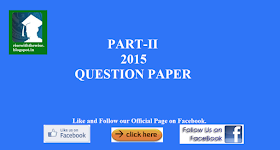For the First time on internet you are going to find all the question papers for the C.U.English Honours.
Your search for the CU English Honours question paper 2015 ends here.
Make most of it!
And at the same time help us to reach others by sharing our posts on FB and help us in fetching more likes. With your continuous support we will be able to provide help to all the C.U. English Honours students for a long time to come, otherwise we will perish in short time.
Your search for the CU English Honours question paper 2015 ends here.
Make most of it!
And at the same time help us to reach others by sharing our posts on FB and help us in fetching more likes. With your continuous support we will be able to provide help to all the C.U. English Honours students for a long time to come, otherwise we will perish in short time.
2015
ENGLISH-HONOURS
Fourth Paper
Full Marks-100
The figures in the
margin indicate full marks.
Candidates are
required to give their answers in their own words as far as practicable.
Group-A
1.
Answer any
one of the following questions: (within 600 words) 16x1
a)
In Pride
and Prejudice Jane Austen uses irony as an instrument of social criticism.
Discuss.
b)
Pride
and Prejudice Lives and moves in the character of Elizabeth Bennet. Examine
the appropriateness of the remark.
c) Critically
analyse the major conflicts in Scott’s Kenilworth.
d) Examine
the plot of Kenilworth.
Group-B
2. Answer any one
of the following questions: (within 600 words) 16x1
a)
Critically analyse ‘Of Studies’ to bring out
Banquo’s qualities as an essayist.
b)
Comment on the Orwell’s narrative technique in Shooting an Elephant.
3. Explain with
reference to the context. Any one of
the following phrases: (within 300 words)
8x1
a)
I had grown to my desk, as it were; and the wood
had entered into my soul.
b)
I often wondered whether any of the other
grasped that I has done it solely to avoid looking a fool.
Group-C
4. Write note (in around 200 words each) on any two of the following literary
terms. 5 x 2
a.
Flat Character
b.
Bildungsroman
c.
Setting
d.
Gothic Novel
Group-D
5. Answer any two
of the following questions: (each within 600 words) 16 X 2
a)
Show how Joyce’s Arab is a study of adolescence.
b)
How does H.E. Bates portray the character of
Mrs. Thurlow in ‘The Ox’?
c) Comment
of the fly episode of the story ‘The Fly’
and show how it relates to the theme. Group-E
5. Answer any one
of the following questions: (within 700 words) 18
X 1
a)
Discuss the allegorical meaning of The Secret Sharer.
b)
In The
Secret Sharer the Captain’s character changes after his encounter with
Leggatt. Do you agree with this view? Justify your answer.
CHECK OUT THIRD PAPER.
Click Here
More Question Papers:
- 2014 Paper-IV
- 2014 Paper-III
- 2013 Paper-IV
- 2013 Paper-III
- 2012 Paper-IV
- 2012- Paper-III
- 2011- Paper-IV
- 2011- Paper-III
If you are looking for high-quality study materials and notes for the college and university hen don't forget to buy our Exclusive Wise Notes. You will get more than 130 notes covering the complete syllabus of the Semester I and II at a highly affordable price.
Boost Your CU English Honours Preparation with Wise Notes
We also provide high quality C.U. English Honours notes with our exceptional collection called 'Wise Notes'. Buy it and boost your preparation for the upcoming examination. Wise Notes are available for First and Second Semester student at highly affordable price.Eager to buy Wise Notes: Click Here.
Wish to know more about Wise Notes: Click Here.
Get in touch with us for more information: Click Here.








